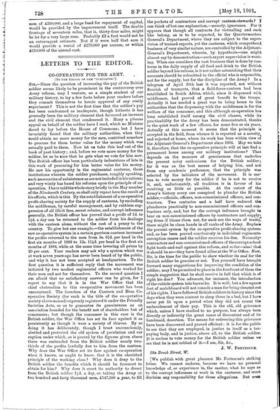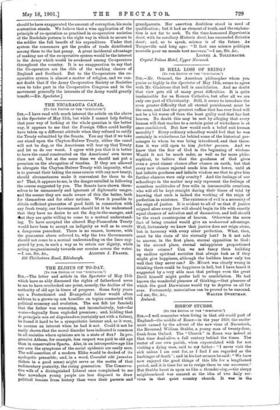LETTERS TO THE EDITOR.
CO-OPERATION FOR THE ARMY. (To TEE EDITOR OF TEE "SPECTATOR.") Sin,—Since the question of increasing the pay of the British soldier seems likely to be prominent in the controversy over
Army reform, may I venture, as a simple student of our military history, to lay a few facts before your readers before they commit themselves to heroic approval of any costly experiment ? This is not the first time that the soldier's pay has been condemned as inadequate, though hitherto it has generally been the military element that favoured an increase
and the civil element that condemned it. Many a piteous appeal on behalf of the soldier have I read, which no Minister dared to lay before the House of Commons; but I have invariably found that the military authorities, when they could obtain no more money for the men, contrived somehow to procure for them better value for the money which was actually paid to them. Now let us take this leaf out of the book of past history ; and, before we vote more money for the soldier, let us be sure that he gets what we vote for him now. The British officer has been particularly industrious of late in this work of procuring for him better value for his money. He saw his opportunity in the regimental canteens, those institutions wherein the soldier purchases, roughly speaking, such necessaries of subsistence as are not included in his rations; and very wisely has based his reforms upon the principle of co- operation. I have told the whole story briefly in the May number of the Nineteenth Century, so shall only repeat here the result of his efforts, which is this. By the establishment of a co-operative profit-sharing society for the supply of canteens, by excluding the middleman, by careful management, and by ruthless sup- pression of all illicit fees, secret rebates, and corrupt influences generally, the British officer has proved that a profit of id. to lid a day can be returned to the soldier from his dealings with the canteen alone, without the cost of a penny to the country. To give but one example,—the establishment of the new co-operative system in a certain garrison-canteen increased the profits returned to the men from 5s. Old. per head in the first six months of 1893 to 13s. hid, per head in the first six months of 1894, while at the same time lowering all prices by 20 per cent. Your readers may ask why a system which was at work seven years ago has never been heard of by the public, and why it has not been accepted at headquarters. To the first question it is sufficient reply that the movement was initiated by two modest regimental officers who worked for their men and not for themselves. To the second question I am afraid that no satisfactory answer can be given, for I regret to say that it is in the War Office that the chief obstruction to this co-operative movement has been
encountered. The founders of the Canteen and Mess Co- operative Society (for such is the title of the co-operative society above-named) expressly registered it under the Friendly Societies Acts, so as to guarantee its genuineness as an association founded for the benefit not of shareholders but of consumers; but though the consumer in this case is the British soldier, the War Office has set its face against it as persistently as though it were a society of thieves. By so doing it has deliberately, though I trust unconsciously, abetted and protected the old system of peculation and cor ruption under which, as is proved by the figures given above there was embezzled from the British soldier nearly two- thirds of the profits lawfully due to him from the canteen. Why does the War Office set its face against co-operation
when it knows, or ought to know, that it is the cherished 59a Brook Street, W.
principle of the working class ? Why does it deny to the [We publish with great pleasure Mr. Fortescue's striking British soldier the benefits which it should be foremost to letter. We cannot endorse, because we have no personal obtain for him-? Why does it exert its authority to divert knowledge of, or experience in, the matter, what he says as from the British soldier lid. a day, or, taking the Army at to the corrupt influences at work in the canteens, and must two hundred and forty thousand men, £547,500 a year, to fill disclaim any responsibility for those allegations. But even the pockets of contractors and corrupt canteen-stewards? I can think of but one explanation,.—namely, ignorance. For it appears that though all contracts for victualling and such like belong, as is to be expected, to the Quartermaster. General's Department, where they are subject to the super.
vision of trained experts, yet the canteens, which comprehend business of very similar nature, are controlled by the Adjutant. General's Department, wherein, by hypothesis—one might almost say by demonstration—such expert supervision is want- ing, When one considers the vast business that is done by can. teens in the daily supply of all food and drink to the British soldier beyond his rations, is it not rather astonishing that their accounts should be submitted to the official who is responsible, not for the supply, but for the discipline of the Army? In a telegram of April 30th last it was reported, not without flourish of trumpets, that a field-force-canteen had been established in South Africa, which, since it dispensed with middlemen, had proved of great benefit to the troops.
Actually it has needed a great war to bring home to the authorities that the dispensing with the middleman is for the welfare of the consumer, and this although co-operation has long established itself amang the civil classes, while its practicability for the Army has been demonstrated, thanks to the quiet work of a few officers, for some five or six years.
Actually at this moment it seems that the principle is accepted in the field, from whence it is reported as a novelty,
and rejected at home, where its work has been within view of the Adjutant-General's Department since 1894. May we take it, therefore, that the co-operative principle will at last find a permanent home among our military institutions? That depends on the measure of genuineness that underlies the present noisy enthusiasm for the British soldier; for it was as the best means of helping him, and not from any academic preference, that the principle was selected by the initiators of the movement. It is use- less to vote money for the soldier if he is not to receive it, and, unfortunately, all tradition is in favour of his receiving as little as possible. At the outset of the Army's history every one conspired to plunder the British soldier,—officials, officers, non-commissioned officers, and con- tractors. Two centuries and a half have reduced the plunderers practically to non-commissioned officers and con- tractors only, and, but for the corrupt influence brought to bear on non-commissioned officers by contractors and supply- ing firms (I blame them not, for such are the ways of trade), there might be clean hands in all ranks of the Army. Replace the present system by the co-operative profit-sharing system, and, as has been proved conclusively in individual regiments, corruption ceases and the soldier receives his due. Naturally, contractors and non-commissioned officers of the corrupt school fight tooth-and-nail against this reform, and so far—alas! that it should be so—they have found allies at the War Office. Now, Sir, is the time for the public to show whether its zeal for the British soldier be genuine or not. You yourself have brought forward many suggestions for improving the condition of the soldier; may I be permitted to place in the forefront of them the simple suggestion that he shall receive in full that which is of right his due? You advocate, for instance, the introduction of the cubicle system into barracks. It is well; but a few square feet of matchboard will not console a man for being cheated out of his rights. I have followed British soldiers in history since the days when they were content to sleep three in abed, but I have never yet lit upon a period when they did not resent the embezzlement of their pay. This is the old, old grievance which, unless I have studied to no purpose, has always been directly or indirectly the great cause of discontent and of its handmaid, desertion. The means for redressing this grievance have been discovered and proved efficient : it is for the public to see that they are employed, in justice to itself as a tax- paying body, and in justice, above all, to the British soldier. It is useless to vote money for the British soldier unless we see that he is not robbed of it.—I am, Sir, Ste., J. W. FORTESCIIN. should he have exaggerated the amount of corruption, his main contention stands. We believe that a wise application of the principle of co-operation as practised in co-operative societies of the Rochdale pattern is the right way in which to secure to the soldier the full benefit of his expenditure. Under that system the consumers get the profits of trade distributed among them to the last penny. A great incidental advantage of making use of the co-operative system would be the interest in the Army which would be awakened among Co-operators throughout the country. It is no exaggeration to say that the Co-operators are the elite of the working classes of England and Scotland. But to the Co-operators the co- operative system is almost a matter of religion, and we can- not doubt that if the Army Co-operative Society or Societies were to take part in the Co-operative Congress and in the movement generally the interests of the Army would greatly benefit.—ED. Spectator.]







































 Previous page
Previous page